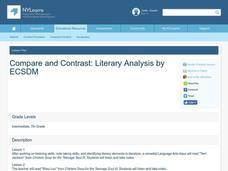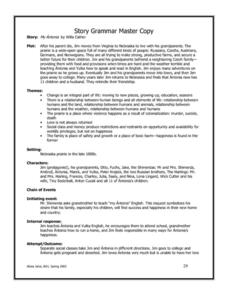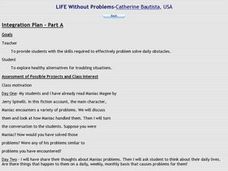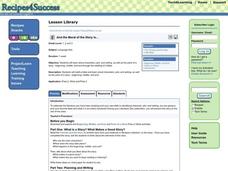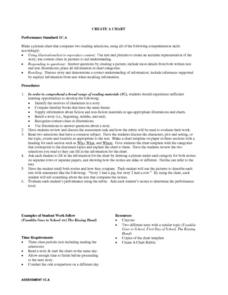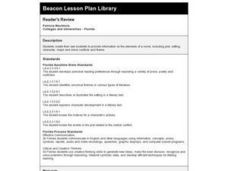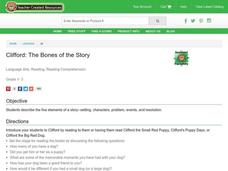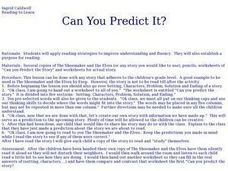Curated OER
Nursery Rhymes
Students recall details of nursery rhyme read by teacher, identify main characters, and demonstrate knowledge of poem by creating concept map about story that includes title, clip art, and changes in font and color.
Curated OER
Compare and Contrast: Literary Analysis
Seventh graders are able to use active listening skills, take notes and identify literary elements of a short story. They use/create graphic organizer, compare/contrast literary elements from various stories and compare and contrast traits.
Curated OER
The World Around Me
Combining visual and language arts, here is a resource that prompts middle schoolers to write stories based on pictures of their surroundings. They use digital cameras to take pictures of favorite areas in the school. Next, they choose...
Curated OER
My Antonia: Story Grammar
Pupils can write down all of the major plot elements of My Antonia by Willa Cather on this straightforward worksheet. Learners note down themes, characters, the chain of events, and more.
Curated OER
Prince Ibrahima
Sixth graders read and utilize the facts from the story "Abd al-Rahmen Ibrahima" by Walter Dean Myers to analyze the main character's life which is ruined by conflict, jealousy, and greed. Journal entries are created in response to the...
Curated OER
Maniac Magee: Life Without Problems
Young readers discuss how they would deal with problems faced by the main character in Maniac Magee. They write down their own problems and exchange them with others to analyze and provide possible solutions. They establish a "Dear Abby"...
Curated OER
The "Write" Stuff: Strategies and Conventions for Imaginative Writing
Fifth graders develop and practice the steps involved in imaginative writing. They follow the steps/worksheets included and write imaginative stories of their own.
PBS
Figurative Language and Foreshadowing in The Outsiders
S.E. Hinton's The Outsiders is still relatable to teenagers today, even though it was written more than 50 years ago. Explore how the figurative language of the story works to establish characterization, and how foreshadowing lays out...
Curated OER
Dragonwings: Explore Chapters 1-5
If you are beginning Laurence Yep's Dragonwings, this will provide activities for the first five chapters. The objectives include making connections to oneself and the world, organizing information and events, vocabulary acquisition,...
Curated OER
And the Moral of the Story is...
Students discover the parts of a story through the retelling of a fable as well as characters, plot, and setting. This lesson is completed using the program Pixie to create an online storybook.
Curated OER
Egg Carton Stories
Students create stories with better structure when they are able to focus on its characters, setting, and plot. Teacher creates settings, character, and problem cartons with information written on strips of paper.
Curated OER
Information Problem Solving--Lesson 3 of 5
Students examine a selected story/book and practice identifying the setting, characterization, and plot. As a class, they identify problems in the story, turning points and the climax. They use a rubric to evaluate the story, as well.
Curated OER
Create a Chart
Students create charts for story elements. They read two selections that share a common theme and discuss the story elements. They create a chart for the characters, plot, and setting and complete it while reading the selections.
Nazareth College
Creative Writing
Students discuss creative writing—what makes something creative writing? Each learner starts writing a story and after 15 minutes, they pass their story to another who adds to it. After another 15 minutes of writing, the story is passed...
Curated OER
Text Under the Microscope
Students explore plot, setting, point of view, and theme. In this literary elements lesson, students read "The Cask of Amontillado," by Poe and the War of the World script by H.G. Wells. Students identify and define the text elements in...
Curated OER
Reader's Review
Students create booklets to provide information on elements of a novel, including plot, setting, character, major and minor conflicts and theme.
Curated OER
Character Traits
First graders identify the story elements in stories. In this story element lesson, 1st graders read The Tale of Peter Rabbit by Beatrix Potter and they identify the characters, character traits, setting, problem, and solution. They...
Curated OER
Story Elements
Eighth graders identify six story elements (setting, characters, character traits, plot, resolution, and point of view) and create short stories utilizing all six elements. They are introduced to story elements as the things that make up...
Curated OER
The Bones of the Story
Young scholars describe the five elements of a story--setting, characters, problem, events, and resolution. They use the Clifford series of books, and a worksheet imbedded in this lesson to help them explain the five elements of a story.
Curated OER
Parts of a Story
Young scholars read a short fiction book and demostrate comprehension by identifying the main characters, setting, conflict, theme, and summarizing the main points. They organize the information in Inspiration and create a powerpoint to...
Curated OER
Design a Book Cover
Learners use the programs Pics4Learning and ImageBlender 3 to apply their knowledge of characters, plot, setting, symbolism, and conflict to design and create a book cover. Designed as a culminating literature activity.
Curated OER
Chocolate Chaos
Second graders demonstrate the ability to examine the elements of a story (theme, plot, setting, mood) and characters, by discussing and writing about each. They have fun with chocolate related activities and enjoy reading about some...
Curated OER
Can You Predict It?
Students apply reading strategies to improve comprehension and fluency. They establish a purpose for reading. Students read the The Shoemaker and the Elves by Esop. They go over the setting, characters, problem, solution and ending of a...
Curated OER
Reading Short Stories
In this graphic organizer worksheet, students fill in the graphic organizer with the predictions, settings, characters, background, and more for short stories. Students complete 5 sections.



